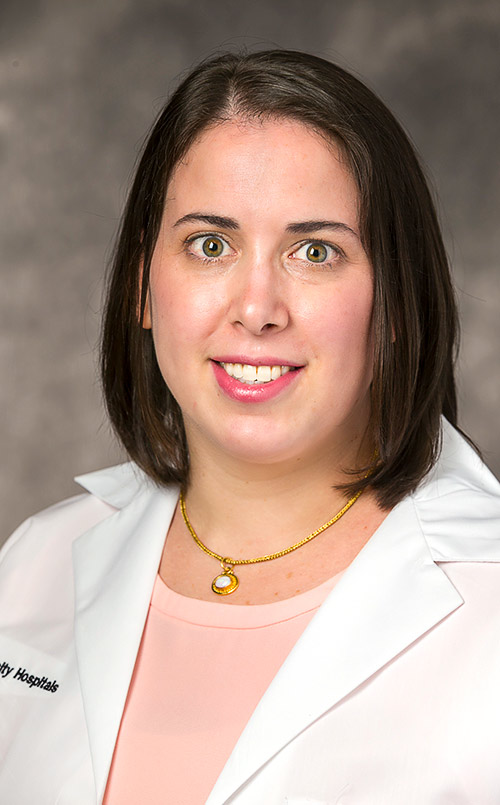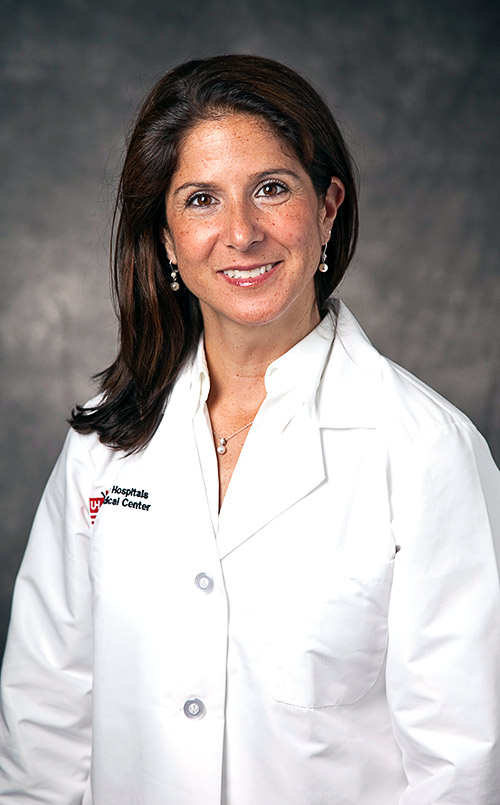Research and Education Initiatives Enhance Colorectal Surgery Experience
October 20, 2020
Weekly Zoom conference, UH RISES program offer opportunities to improve skills and knowledge
Innovations in Digestive Health | Fall 2020
 Emily Steinhagen, MD
Emily Steinhagen, MD Sharon Stein, MD
Sharon Stein, MDThe pandemic upended virtually every aspect of the Colon and Rectal Surgery training at University Hospitals Cleveland Medical Center. However, trainees had no shortage of opportunities to improve their skills and connect with their peers.
Colorectal surgeon Emily Steinhagen, MD, FACS, FASCRS, who serves as the director for the third-year medical student General Surgery Clerkship Program at UH Cleveland Medical Center, says she immediately re-organized rotations and added online education so medical students could keep learning and training from home. General surgery residents pitched in to teach virtual didactic sessions to the medical students. By early summer, when volume picked up, they put that training to use.
These modifications enhanced simulation-based learning opportunities already in place, which were not affected by a temporary decrease in elective surgeries, says Dr. Steinhagen, who also is a Clinical Assistant Professor at Case Western Reserve University School of Medicine. As limitations on gatherings lift, medical students will receive improved exposure to benign surgical problems via newly developed hands-on skills labs for anorectal diseases.
The colorectal program also participated in a national effort to improve education for Colon and Rectal Surgery residents. Thanks to initiative taken by 2020 resident William Kethman, MD, and colleagues inside and outside UH, residents have a new way to interact with peers and experts worldwide — a Zoom educational conference.
Every Sunday at 7 p.m., residents and fellows from programs around the country and worldwide log on to discuss colorectal topics. “Somewhere between 50 and 90 doctors get together to talk about diverticular disease, how to create a J Pouch, and other colorectal surgery topics,” says Sharon Stein, MD, Program Director, Colorectal Surgery, UH Cleveland Medical Center, and Associate Professor at the School of Medicine. “Many other programs didn’t have the opportunity to provide the education they would have liked. The onus was on us to put something together not only for our residents, but for other future colorectal surgeons, medical students, and doctors in practice. Anyone who wants to join is welcome.”
RISING ABOVE
That above-and-beyond training extends to future researchers. Allen Scholars — residents who commit to a two-year research program — have an opportunity to participate in clinical outcomes research with UH RISES (Research In Surgical Outcomes & EffectivenesS Center). UH RISES brings together all 11 divisions within the Department of Surgery to enhance surgical outcomes research.
UH Allen Scholars have been extremely productive this year, with colorectal residents who participated in 2020 contributing to more than 20 papers in their two years of research, says Dr. Stein, who is director of UH RISES. “When each applies for fellowships, not only will their CV look good, but they will be better consumers of research, which will make them much better surgeons.”
Colorectal residency is competitive, particularly at a program like UH. “We want colorectal fellows to be well rounded, having excellent technical skills, but also a comprehensive understanding of how to improve patient care,” she says. “A record of productivity in research shows a level of commitment to improving our specialty as well demonstrating that they can perform well.“
Performing well means delivering the highest quality of care, which is what happens when education, research and clinical practice come together. “By staying aware of the latest research and producing important research, we enrich ourselves and bring that heightened perspective to our patients,” Dr. Steinhagen says. “We teach residents how to manage a variety of situations, and what they learn on our service can have an impact elsewhere in their careers.”
Having the next generation of physicians at your side also adds another layer of assurance to UH’s colorectal surgery division. “Patients come to me because they want the best outcomes,” Dr. Stein says. “The way I do that is with residents, fellows and medical students. Sometimes it’s the medical student that asks the question that helps us solve a problem. When you continue to teach, you continue to be more thoughtful — you have to justify what you’re doing and answer questions. That’s how we continue to improve.”
To learn more about the colorectal surgery residency program, call 216-286-7436.


